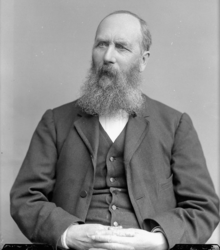Douglas Brymner
| Douglas Brymner | |
|---|---|

Douglas Brymner, 1892
|
|
| Born |
July 3, 1823 Greenock, Scotland |
| Died | June 19, 1902 (aged 78) New Westminster, British Columbia, Canada |
| Children |
William Brymner George Douglas Brymner |
Douglas Brymner (July 3, 1823 – June 19, 1902) was a Canadian politician, journalist, civil servant and archivist.
Born in Greenock, Scotland, Brymner immigrated to Canada in 1857 with his wife and son settling in Melbourne, Lower Canada. He served two terms as mayor of Melbourne before moving to Montreal in 1864 where he became editor of the Presbyterian and joined the editorial staff of the Montreal Herald. In 1872, he moved to Ottawa where he worked as Senior Second Class Clerk in charge of archives for the Department of Agriculture. In 1872, he was appointed the first Dominion Archivist, a position he held until his death in 1902. In 1895, he was elected a fellow of the Royal Society of Canada. In 1898 he was elected a member of the American Antiquarian Society.
After Canadian Confederation in 1867, there was a major push led by the Literary and Historical Society of Quebec for a national archive; it was a deemed as necessary for the Canadian government to create an archive because of the relationship between archives, history, national consciousness and national unity. A petition had been signed by more than fifty leading authors and scholars that urged parliament to create a repository of historical archives where archives could be collected, maintained, arranged and accessible to scholars for reference. The petition was strongly endorsed by the Canadian Library Committee and was transfer to the Minister of Agriculture who at the time was responsible for arts and manufactures. The petition was then put into action and in 1872 Canadian Parliament voted a sum of $4000 to the creation. Parliament appointed Douglas Brymner, then a noted journalist, as Senior Second Class Clerk and was responsible to oversee and create a national records repository and undertake general archival responsibilities.
Brymner, given the task of creating a Canadian Archives and was allocated, as reported later, an empty room and vague instructions; in starting, there was no single document with any description. Brymner approached his new position with lots of enthusiasm though and in his first year visited Toronto, Montreal, Quebec, Halifax, Saint John and Fredericton, reporting on the state of various accumulations of government records. In doing so, he captured his first major collection of records. In Halifax records of the British Army from the conquest of Canada in 1759 to the withdrawal of garrison in 1871 were found and transferred to Ottawa. These records, estimated at 400,000 items were the first major accession for the new archives.
...
Wikipedia
